My Beloved Son
Matthew 2-3

Magi
Jesus was born—the king who came straight from Heaven, and only a few people recognized it. Creation displays the glory of God, and he wields the universe to announce the arrival of the King of the Jews. Three wise men, Gentile sinners, could see his star rising in the east and understand the significance of its appearance —that the king had arrived! They went to the most likely place to find the one-born King of the Jews—Jerusalem. They must have been surprised to find the reigning king utterly unaware of the star and its meaning. The question unsettled the entire city, and people were looking for answers. These foreigners explain that they saw the star of this king when it rose, and they had come to worship him.
Herod, appointed as the Jewish king by the Roman leaders Antony and Octavian, would naturally feel threatened by the announcement of the birth of the Jewish Messiah-King. A highly suspicious man, he had earlier killed relatives because of an imagined conspiracy against him. He could not tolerate a threat to his position, so he assembled the people's religious leaders and inquired about where the Christ would be born. It was not a difficult question for the priests and scribes to answer because the prophet Micah was clear about the birthplace of Christ. Herod summons the wise men secretly to establish a timeline for this event. He then instructs them to go and search diligently for this king and then send him word about his whereabouts so that he may join them in worship.
They comply and make their way to Bethlehem. Bethlehem is only about six miles away, but no one went with the Magi to see if God's Messiah had arrived. God wields the heavens, and the star they had seen returned and went before them, guiding them to the King. Filled with joy, they come to the house and worship Jesus. They give him their treasures and wonder at what they are experiencing. Mary and Joseph have seen many miraculous things because of their miracle son, but they must have been surprised to see these strangers from the east arrive and worship the King of the Jews they have been seeking. When they finish their visit, they are warned in a dream not to return to Herod and to travel home by a different route.
Herod, appointed as the Jewish king by the Roman leaders Antony and Octavian, would naturally feel threatened by the announcement of the birth of the Jewish Messiah-King. A highly suspicious man, he had earlier killed relatives because of an imagined conspiracy against him. He could not tolerate a threat to his position, so he assembled the people's religious leaders and inquired about where the Christ would be born. It was not a difficult question for the priests and scribes to answer because the prophet Micah was clear about the birthplace of Christ. Herod summons the wise men secretly to establish a timeline for this event. He then instructs them to go and search diligently for this king and then send him word about his whereabouts so that he may join them in worship.
They comply and make their way to Bethlehem. Bethlehem is only about six miles away, but no one went with the Magi to see if God's Messiah had arrived. God wields the heavens, and the star they had seen returned and went before them, guiding them to the King. Filled with joy, they come to the house and worship Jesus. They give him their treasures and wonder at what they are experiencing. Mary and Joseph have seen many miraculous things because of their miracle son, but they must have been surprised to see these strangers from the east arrive and worship the King of the Jews they have been seeking. When they finish their visit, they are warned in a dream not to return to Herod and to travel home by a different route.
A Different Exodus
Jesus' family had already undergone its share of difficulty: traveling while Mary was great with child, seeking a place to lodge, entertaining shepherds, and registering for a census commanded by a foreign government are just some of the challenges this family has faced. Some time has passed, but God uses a dream to instruct and direct Joseph. This dream contains the warning that Herod would be on a search and destroy mission, so they needed to leave for Egypt. Joseph does what any good father would and immediately goes under cover of night. Joseph, Mary, and Jesus stayed in Egypt and awaited word from God about when to return home. Hosea had prophesied that God would call his Son out of Egypt, so he did.
Meanwhile, Herod learns that his plan to exploit the wise men has failed, and the paranoid tyrant takes matters into his own hands. He gives orders to kill every infant under two years in Bethlehem and the surrounding area. Even this unspeakable act fulfills what the Bible says in Jeremiah 31:15. After the death of Herod, an angel appears in a dream to Joseph and sends this young family to Nazareth, where Jesus will grow up. This to fulfills the prophecy that Jesus would be a Nazarene.
Meanwhile, Herod learns that his plan to exploit the wise men has failed, and the paranoid tyrant takes matters into his own hands. He gives orders to kill every infant under two years in Bethlehem and the surrounding area. Even this unspeakable act fulfills what the Bible says in Jeremiah 31:15. After the death of Herod, an angel appears in a dream to Joseph and sends this young family to Nazareth, where Jesus will grow up. This to fulfills the prophecy that Jesus would be a Nazarene.
Repentance
Matthew shifts quickly to Jesus' adulthood, passing almost thirty years between chapters 2 and 3. Jesus' cousin John preceded Him in the public eye, fulfilling the prophecies that one like Elijah would come to prepare the way for the Christ. He is known as "the Baptist" because he called Jews to repent of their sins and demonstrate their faith by immersion in water, a rite otherwise primarily reserved for Gentile proselytes to Judaism.
John's appearance was rough, and he shared similarities between himself and Elijah. Some people began to wonder if God had finally broken his silence after four hundred years. John did not mince words, drew attention to his intensity, and his message captured the people's attention. John explains that fruit is the evidence of repentance, and those that do not bear such fruit must expect judgment and condemnation. His call to repentance is one of water, but he explains that the one coming would "baptize them with the Holy Spirit and fire." He declares that the one to come after him was so great that he was not even worthy of being his servant. The message is blunt, but the servant is humble. God is a consuming fire, and he must act resolutely toward sin.
John's appearance was rough, and he shared similarities between himself and Elijah. Some people began to wonder if God had finally broken his silence after four hundred years. John did not mince words, drew attention to his intensity, and his message captured the people's attention. John explains that fruit is the evidence of repentance, and those that do not bear such fruit must expect judgment and condemnation. His call to repentance is one of water, but he explains that the one coming would "baptize them with the Holy Spirit and fire." He declares that the one to come after him was so great that he was not even worthy of being his servant. The message is blunt, but the servant is humble. God is a consuming fire, and he must act resolutely toward sin.
The Baptism
John is resistant to Jesus' request for baptism because he recognizes Jesus' authority and mission. Jesus explains that his baptism was different than others because He had no sins to confess, but it will fulfill righteousness. John submits and baptizes Jesus. As Jesus comes up from the water, the three persons of the Godhead manifest themselves in this incredible moment. A voice speaks from heaven. It is the voice of the Father from heaven to his beloved Son.
Jesus, the eternal Son, has become flesh. The Father expresses his delight in the Son, and the Spirit of God descends like a dove to rest on Jesus. The Holy Spirit marks both the commencement of his public ministry and anoints Jesus for that ministry (Isa. 61:1–2; Acts 10:38). Condescension, love, and grace combine at this moment as Jesus, the God-man with clothes dripping while standing in Jordan, receives the blessing from on high.
Jesus, the eternal Son, has become flesh. The Father expresses his delight in the Son, and the Spirit of God descends like a dove to rest on Jesus. The Holy Spirit marks both the commencement of his public ministry and anoints Jesus for that ministry (Isa. 61:1–2; Acts 10:38). Condescension, love, and grace combine at this moment as Jesus, the God-man with clothes dripping while standing in Jordan, receives the blessing from on high.
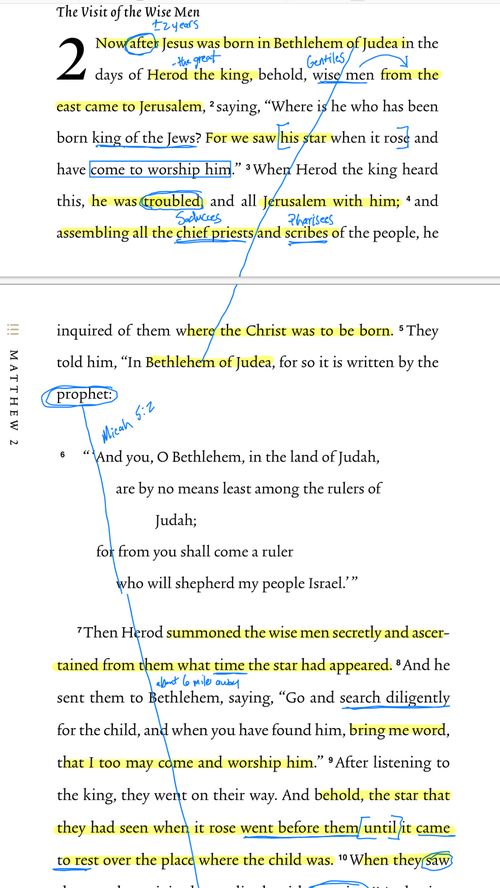
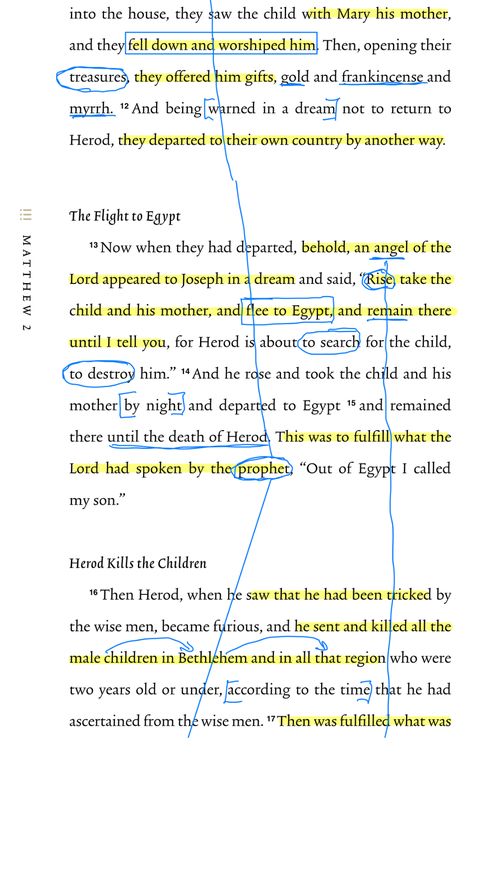
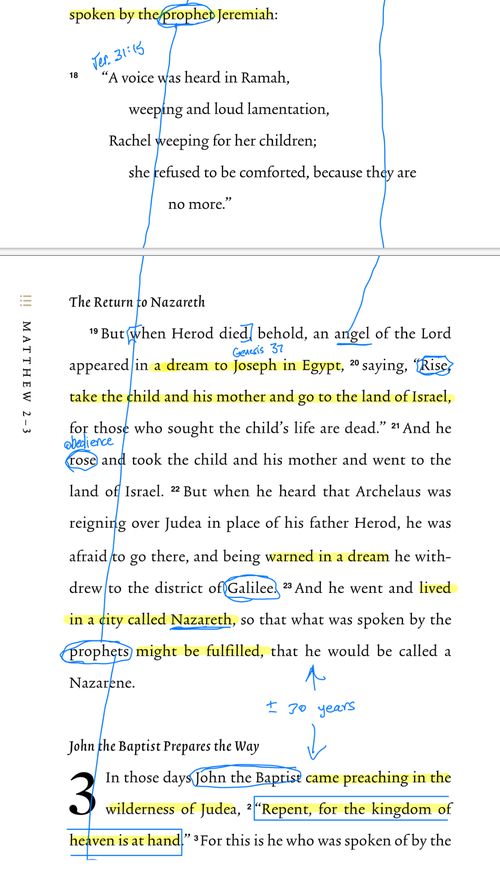
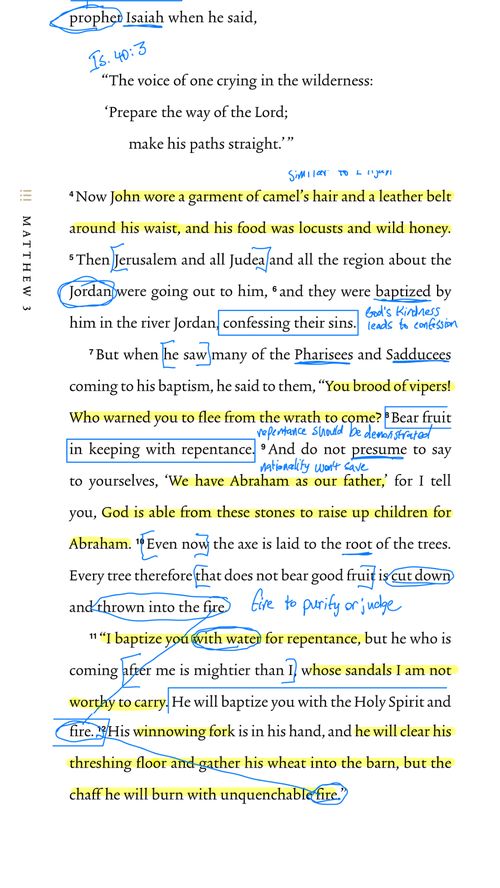
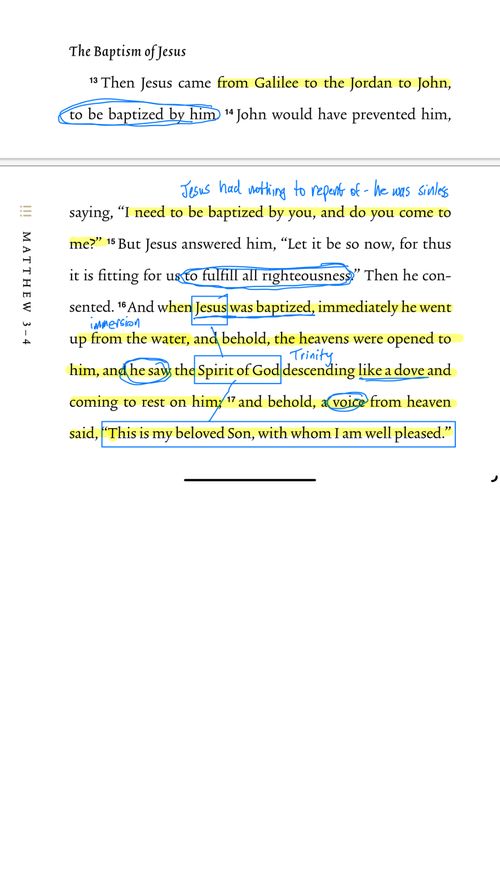

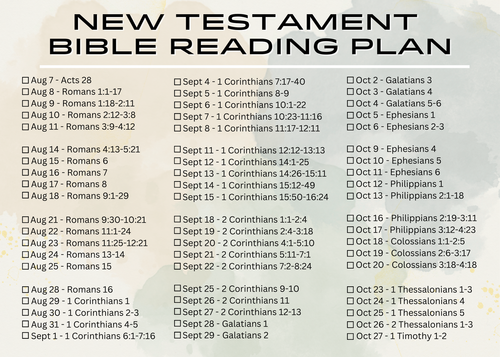
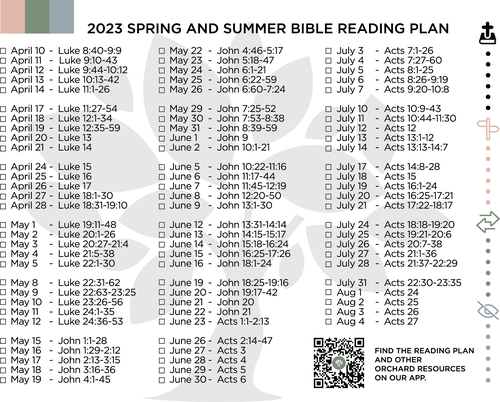
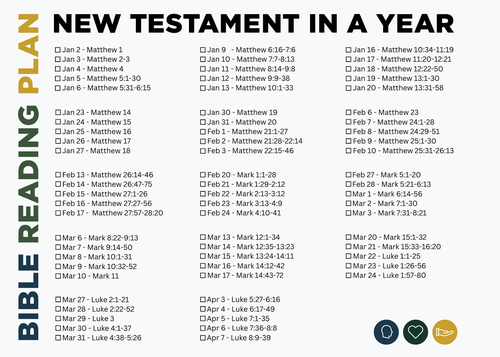
Recent
Archive
2023
January
Happy New Year!He Will Save His People From Their SinsMy Beloved SonTemptation And MinistryThe SermonLeaving, Lying, Limits, Love, Largesse, and The Lord's PrayerTreasure, Anxiety, and JudgmentAstonishing AuthorityStorms, Demons, and HealingJesus Is CompassionateHis Eye Is On The SparrowSwords, Rewards, and MessengersThe Lord of the SabbathBlasphemy, Bad Trees, Signs, and FamilyStories, Sowers, and SoilsParables, Hidden Treasure, and RejectionFame, Food, Fear, Faith, and FringeReal Issues And The Power Of GodDying To Find LifeLike The SunChildren, Temptation, Sheep, And ForgivenessMarriage, Kids, And MoneyTo Serve And Give His Life
February
The ArrivalStories That StingQuestion TrapsHidden Motives And LamentThe End...?UnexpectedReady?Punishment, The Plot, And PerfumeTreachery, Passover, and The CupBetrayal, Injustice, And DenialThe Field Of Blood And The GovernorCrucifixion And DeathAll AuthorityMark—The Beginning Of The GospelHealing, Preaching, And The Forgiveness Of SinEating With Tax Collectors, Fasting, The Sabbath, And An Escape BoatThe Twelve, Blasphemy, Family, And A ParableParables And PowerA Different Kind Of StormPower Had Gone Out
March
Death, Hunger, And MiraclesCommandment Or TraditionDo You Not Yet Understand?The Christ And A Glimpse Of His GloryUnbelief, Confusion, And SinDivorce, Children, And PossessionsTo Give His Life As A RansomHosannaThe Rejected Stone, Taxes, And The Great CommandmentDestruction And The EndNo One Knows, An Anointing, And A Promise To BetrayPassover And GethsemaneThe Kiss, Arrest, And DenialPilate, Simon, And The CrucifixionDeath, Burial, Resurrection, And What\'s NextTheophilus And A Visit From GabrielMary And The MagnificatBenedictusThe Arrival And The ShepherdsSimeon, Anna, And The SpiritFruits Keeping With Repentance And BaptismThe Wilderness, Nazareth, And CapernaumSimon's Mother-In-Law, Fishing, A Leper, And Sins
April
Tax Collectors, Fasting, Sabbath Controversies, And The TwelveWhy Do You Call Me Lord, Lord?Jesus Marveled, A Raised Son, And QuestionsA Sinful Woman And A ParableObeying The Word, A Storm, And DemonsTwelve Years, Twelve Apostles, And SpeculationGreater, Costly, And GloryNot Getting It, The Cost, And AppointedWoes, Neighbors, And What Is NecessaryHelp Us Pray And A Divided Kingdom?Signs, Lights, And WoesHypocrisy, Fear, A Fool, And AnxietyParables, Division, And The TimesWarnings, A Daughter Of Abraham, And Jerusalem, JerusalemA Son Or An Ox, Parties, And DiscipleshipLost ThingsThe Dishonest Manager, The Law, And Anguish In This FlameMillstones And Mustard SeedsPersistent Prayer, Humility, A Childlike Faith, And The Rich RulerEverything That Is Written, A Blind Beggar, And A Wee Little Man
May
A Parable, A Colt, A Prophecy, And A CleansingAuthority, Wicked Tenants, And TaxesThings To Beware Of And WidowsDestruction, Persecution, The Son Of Man, And WatchingThe Plot, Betrayal, Lord's Supper, And Inappropriate BehaviorPrediction, Fulfillment, Agony, Betrayal, And DenialMistreated, Taken Before The Council, Pilate, Herod, And Delivered To Be CrucifiedCrucifixion, Death, And BurialHe Is Not HereDisbelieved For JoyIn The Beginning…The Lamb Of God And A WeddingZeal, What's Inside, And Born AgainHe Must Increase
Categories
no categories
Tags
no tags
